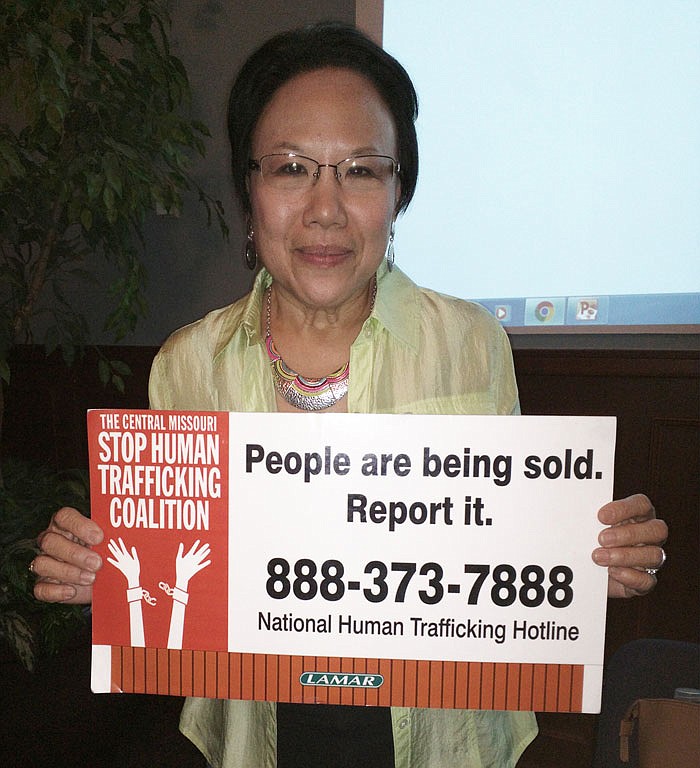Jennifer Lynch visited with students at William Woods University in Fulton earlier this week to talk about human trafficking. She is an undercover special agent with the FBI, headquartered in St. Louis.
"The hospital called to say a girl gave birth," Lynch said. "She didn't speak much English, but she'd called her boyfriend a coyote."
So began one of Lynch's recent labor trafficking cases.
A former code-cracker for the U.S. Navy, Lynch recently started St. Louis' first federal human trafficking task force.
There are two types of human trafficking: labor trafficking and sex trafficking. Sex trafficking will be the subject of its own article on Tuesday.
"Labor trafficking is forced labor, and Missouri is ripe for that," Lynch said.
As a state with both a heavy agricultural presence and a handful of cities, Missouri contains plenty of opportunities for unscrupulous employers. In fact, St. Louis is one of the top 20 trafficking destinations in the U.S., according to Republican state Rep. Elijah Haahr, chair of the Human Trafficking Task Force.
Trafficked individuals end up as farmhands, dishwashers, domestic laborers, construction workers, hotel cleaners and more. Nanette Ward, founding member of the Central Missouri Stop Human Trafficking Coalition, said in her experience, people working in these fields know trafficking is happening around them.
"There are lots of small community police departments that are not aware of the trafficking that might be going on," Ward said.
Some Missouri residents might not fully understand what labor trafficking means. It's not the same as smuggling, though the two crimes can be related. Smuggling refers solely to bringing individuals illegally across international borders.
Trafficking victims could be illegally brought into the United States. Or, they could arrive legally on an agricultural or work visa. They could also be homeless American citizens made to work in sweatshops, or high school students tricked into joining traveling sales teams and prevented from leaving.
"There aren't really any social or economic factors that necessarily determine who's going to be a trafficker, who's going to be a victim," Ward said.
In other words, it could be anyone.
Ins and outs
Labor trafficking is distinguished from other types of labor rights violations by the presence of one of three elements.
1. Force: The worker is prevented from leaving. This could take the form of literal restraints, posted security guards outside the workplace or residence, physical violence or denial of medical care.
2. Fraud: The worker is tricked into taking a job under false pretenses. They could be promised high wages and a chance to live out the American dream but instead be met with bad work conditions and supervisors who take most of their money.
3. Coercion: The worker is kept in line with threats. This could be threats of physical harm against themselves, threats about what their employer might do to their family if they don't cooperate or threats to their reputation.
In the case mentioned above, all three were in play.
The hospital refused to give Lynch the girl's name. All she had to go on was the first name of the boyfriend: Agustin.
"We did some old-fashioned detective work," Lynch said.
The detective work paid off. She found Agustin and Alonzo Lopez-Guzman, brothers who were smuggling people from Mexico for a high price and then forcing them to work in movie theaters to pay off the debt.
Catalina, the girl in the hospital, was one of them.
"Agustin started raping Catalina the day she arrived," Lynch said.
The brothers kept the laborers in line by threatening to call the police. Aside from fearing getting deported, the workers feared the police themselves - Mexican police are often violent, according to Lynch.
"We didn't find this out until after the raid, but Agustin had taken the deeds to their parents' houses," she said.
If the workers rebelled, their parents might lose their home.
Lynch and her team set up simultaneous raids on each brother's home. The living conditions were deplorable. Between Agustin's apartment and Alonzo's house, 28 people were being held captive. One person had scabies. There was a dead mouse sitting on someone's plate.
The workers had to sleep in shifts, with two or three sharing a bed.
"Whoever wasn't in bed was working," Lynch said.
In addition to the people, Lynch found about $11,000 in cash and a handful of fake documents.
"Every smuggler has an 'international driver's license,' which isn't even a thing," she said, snorting.
Ultimately, Alonzo ended up sentenced to two years in jail, while Agustin got five.
"After hearing about Catalina, the judge went above the prosecutor's sentencing recommendation," Lynch said.

